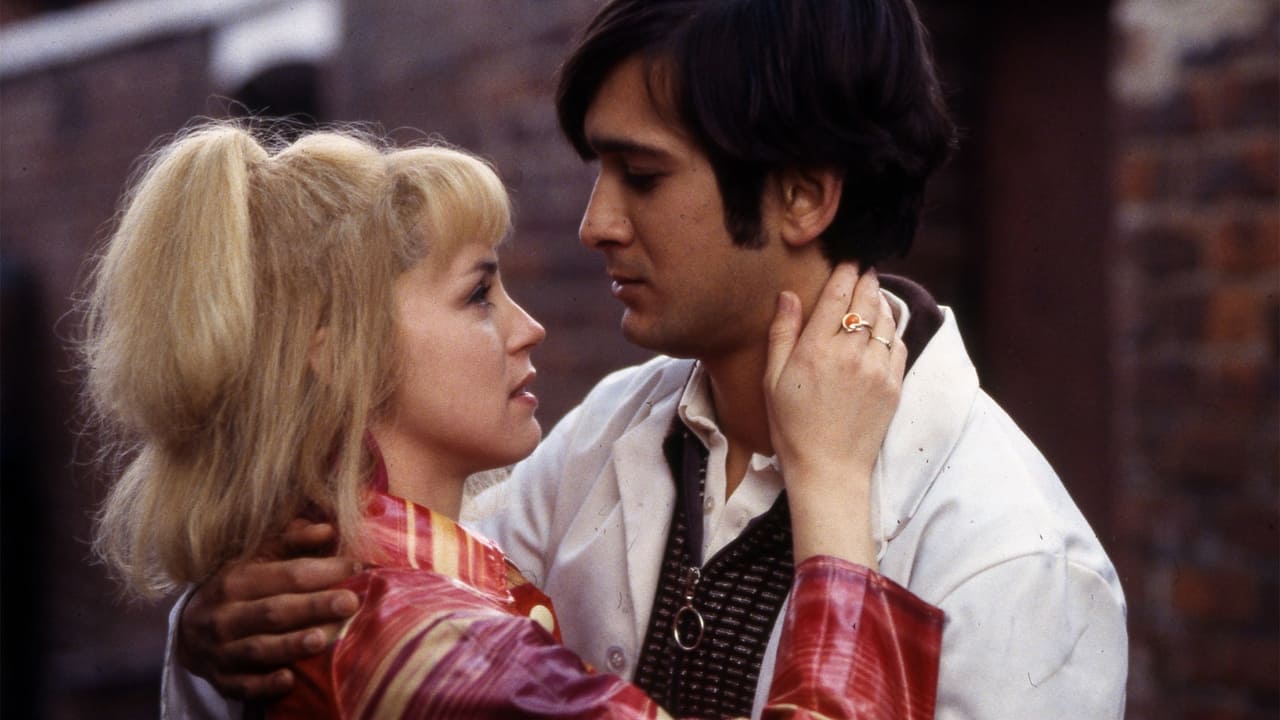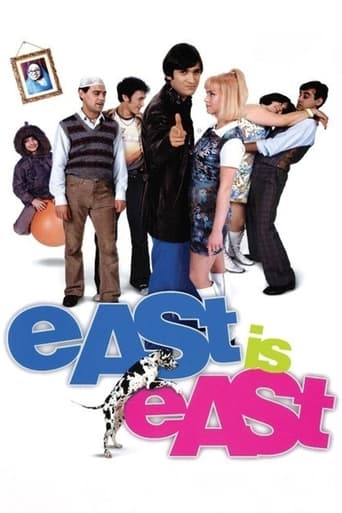2hotFeature
one of my absolute favorites!
Matialth
Good concept, poorly executed.
Breakinger
A Brilliant Conflict
Lollivan
It's the kind of movie you'll want to see a second time with someone who hasn't seen it yet, to remember what it was like to watch it for the first time.
omairajmal2007
This movie was made specifically with only one object at mind. Ridicule Pakistan and Muslims and its culture. Starting with the very first scene which says "George Khan moved from Pakistan to England in 1937. There was NO Pakistan in 1937. It was simply India and they couldn't say he moved from India then western viewers will identify him as Indian NOT pakistani. And they simply did not make the date AFTER 1947 because then the scene with the 1971 war references would become meaningless as his children wouldn't have grown up by then. This is a careful and methodically planned cultural murder. All actors are Indian or of Indian descent, Om puri, Archi Punjabi, Jimi Mistry, emil marwa, etc. Indians are usually passive aggressive people and don't lash out on the face but rather carefully and meticulously plan projects like these to methodically humiliate what they hold a grudge against. I will make sure I post this on all major western websites.
lasttimeisaw
Aka. FISH & CHIP, a UK film whose plot hinges on a Pakistani family living in UK, the patriarch is a traditional chauvinist whose only tenet is to do everything in Pakistani Muslim ways, while the mother is English, with 7 children, the cultural collision and marriage-defiant headaches begin to aggravate the family, and finally ends with a drolly amusing farce. From Irish director Damien O'Donnell (his debut feature), this film emanates a great sense of humour (never pull it off overhead) and a whiff of theatrical commotion when the storyline needs it, supplying career-best leading roles from both Om Puri, who is deft in embodying himself into a highly unlovable character even without any preach-the-converted statement, and Linda Bassett as the chafing-yet-united parent, imaginably with 7 offspring (6 boys and 1 girl, age ranging from 6 to 25) to coping with, the familial disarray can dissuade many chic couples from children-rearing quandary, not counting there is a bigger hurdle standing in front of them, the religious disparity, Puri is an out-and-out Pakistani, even living in England, has an English wife (which is his second one while his first wife is still living in Pakistan), he rebuffs any discord and claims absolute submission from his family members, as long as he is still the man-of-the-house, even resorting to domestic violence when things are out of his control. As the most-of-the-time pliant, sometimes witty, but complete sympathetic mother, Bassett has her gut to fight back for her children, and her performance does has an effect of sublimating the heightened tension and brings about some excellent empathy which sharply differs from a general comedic tonality. All seven progeny and a handful supporting roles are molded with distinctive personalities (with many laughable episodes to entertain the viewers). So, about the aforementioned preach-the-converted argument, the film can be a tint offensive to portray Pakistani people in a quasi-teasing milieu (the two Pakistani maidens are rather wickedly selected), it seems the film is assuming the audience should already taken their stand (against the abominably bigoted father figure), clearly the truth is this fictional approach opts for its own British slant towards the Muslim immigrants, it may find its voice in the island, but elsewhere, its acceptance inevitably needs to be tested under the surface of its light-hearted masquerade. PS: My Oscar entry, Linda Bassett storms at No.6 in the BEST LEADING ACTRESS category.
Lee Eisenberg
Damien O'Donnell's "East Is East" is a clash-of-cultures story. It focuses on a family in Salford in 1971. The father (Om Puri) is a Pakistani immigrant and the mother (Linda Bassett) is an Irish Catholic. The father is trying to raise his children as if he still lives in the old country, but it simply does not fit their upbringing in 1960s-1970s England (especially with what we find out about the oldest son). To be certain, there are some VERY tense scenes when the father thinks that his wife and children are disrespecting him.A particularly funny scene is what somewhat writes on the Bradford sign. Of course, this brings to mind the large South Asian presence in England, or the rising immigrant populations in any country. The point is that there are bound to be issues of cultural assimilation no matter where you are. Most importantly, it's a very good movie. I highly recommend it.
Samantha Olsen
Let me start by saying that this film is terribly mislabeled as a comedy when it is, in fact, very much a drama. Yes, there are times when I laughed out loud but I chose this film because I was in the mood for a comedy. Had I been in the mood for a drama I am sure I would have scored the film much higher."East is East" is the story of a Pakistani father, George Khan, his Caucasian British wife, Ella, and their seven children. The acting is superb, the writing is excellent, and the soundtrack is wonderful. Having said all of that, I do have a few issues with the film. (SPOILER ALERT) First, the oldest son, Nazir, just kind of disappears for a while without any explanation. Did he run away? Did he kill himself? Where did he go? We find out about halfway through the film when his father pronounces that he is dead. This leaves the viewer wondering how one could have missed such an important event, but a few minutes later we realize that Nazir is only dead to him. In fact, we discover, albeit something I guessed in the first ten minutes of the film, that Nazir is gay. This is all the more reason for his Pakistani father to call him dead.My second issue with the film is that I really liked all of the characters, even the strict and traditional George. Ella is charming the way she can talk him down from almost any argument with typical British humor mixed with a few choice swear words. The kids adore their mother and, although they disagree with him, they love their father. This led me to believe that the film was going to be a "Dad is a strict traditional man, kids and mom are not, so this is the story of how everyone changes Dad." (SPOILER ALERT) Unfortunately, the story became, "Dad is an abusive and closed-minded bastard and starts beating on anyone, including mom, who dares to defy him." I just don't understand why the story had to change this way. I left the film wishing Ella would leave her bastard husband and raise her kids on her own. We went from the tenderness of how Ella would ask George if he would like some tea and he would reply, "just half a cup", to George calling her a "bloody b****" and giving her a black eye. Why? My final issue with the film is the ending. (SPOILER ALERT) We are left with nothing changed in the family other than the children discovering that their father isn't just strict, he is cruel. I just feel incomplete after watching "East is East". I get that the Pakistani culture is very different from British culture and that, particularly in the 1970's, the west was not very open to accepting this new group of immigrants. What else came of this story? I don't feel warm and fuzzy toward this culture if George is a shining of example of how the men truly behave. Why did he choose to marry outside of his own culture if he hates it so much? Why raise children with a mother who is not Muslim and not from Pakistan if you are just going to teach them that it is unacceptable to marry anyone who is not from Pakistan? I feel like I got a glimpse of a very dysfunctional family who will never see a happy ending and that is just not why I choose to watch films. I watch films to learn something new, or to laugh, to perhaps cry a little, but overall, I watch films to have a few hours of enjoyment. I watch films to forget my own problems for a while. After watching this, I just feel like I would have been better off calling my own family back home and hearing about their issues and problems.

